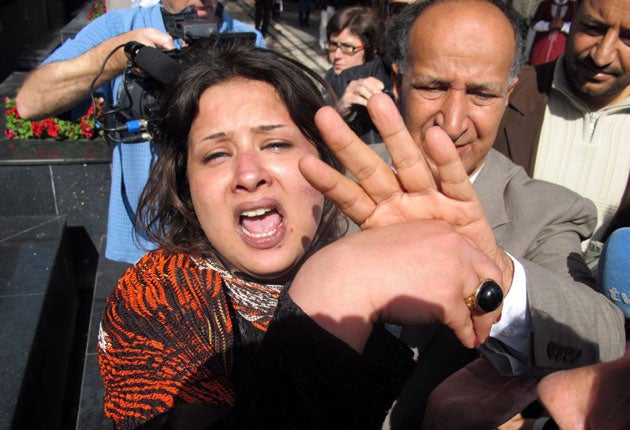Woman's rape claim opens rare window into regime
Donald Macintyre witnesses chilling incident in hotel

Your support helps us to tell the story
From reproductive rights to climate change to Big Tech, The Independent is on the ground when the story is developing. Whether it's investigating the financials of Elon Musk's pro-Trump PAC or producing our latest documentary, 'The A Word', which shines a light on the American women fighting for reproductive rights, we know how important it is to parse out the facts from the messaging.
At such a critical moment in US history, we need reporters on the ground. Your donation allows us to keep sending journalists to speak to both sides of the story.
The Independent is trusted by Americans across the entire political spectrum. And unlike many other quality news outlets, we choose not to lock Americans out of our reporting and analysis with paywalls. We believe quality journalism should be available to everyone, paid for by those who can afford it.
Your support makes all the difference.We still don't know how she got to the hotel, let alone past security, but no one who was eating breakfast in the Rixos hotel restaurant on Saturday morning will easily forget Eman al-Obaidi's entrance.
Forcing her way past hotel staff, she bared her thigh to show the lacerations she was shouting had been inflicted on her by Gaddafi loyalists. Whatever the background to her complaints that she was raped and attacked multiple times, no one could doubt this was a woman in deep distress.
What was initially disconcerting about the running – occasionally violent – melee that followed as journalists tried to interview her, was the way the hotel staff suddenly became an arm of the state.
The pretty waitress, friendly enough during her normal duties, was the one who picked up the table knife and threatened the distraught woman with it, shouting that she was a "traitor" to Muammar Gaddafi; the gentle giant, or so it seemed, who made the extra effort to get mobile phone top-up cards when we had been stopped from leaving the hotel, turned suddenly into a heavy, part of a posse determined to silence the weeping Ms al-Obaidi.
This was almost as chilling as the bunch of thuggish central casting plain-clothes security men and "minders" who quickly mobilised across the restaurant to try not only to detain Ms al-Obaidi but to keep the press away from her.
It was a mean-looking operative, in a three-quarter-length leather coat, who pulled out a handgun – which he did not shoot or fire – within a metre of a television reporter; it was an even meaner-looking leather-jacketed agent who threatened Channel 4 News's Jonathan Miller – who had already been punched once – and it was yet another of their colleagues who smashed a CNN camera.
But this was not really about the press; it was much more about the way in which Ms al-Obaidi's at times intensely physical struggle – brave, desperate or both – to tell a story opened a rare window on the way the state operates when it believes it may have something to hide.
Libyan officials who subsequently stressed that Ms al-Obaidi's complaints were now the subject of a "normal criminal investigation", have hinted without evidence that she might be a prostitute and said that one of the men involved in the case may be the son of a high-ranking regime official.
But even if all this were true, there were infinitely more civilised ways, to put it mildly, of dealing with the fracas.
* Charles Clover, a correspondent for The Financial Times, has been deported from Libya for unspecified reasons to do with the paper's coverage.
Join our commenting forum
Join thought-provoking conversations, follow other Independent readers and see their replies
Comments